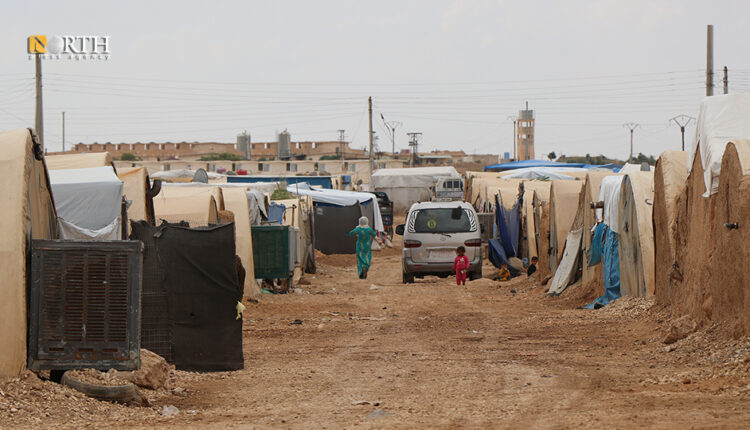
By Samer Yassin/Nalin Ali
HASAKAH, Syria (North Press) – Muhammad Abdulatif and his family prepare for winter by doing restoration inside the tent and house in which they live in Washokani camp for Sere Kaniye (Ras al-Ain) IDPs in northern Hasakah, northeastern Syria.
Abdulatif and his family of seven were displaced from the village of al-Ahras in the countryside of Sere Kaniye following Turkey’s invasion of the city and its countryside.
Unfit for animals
Abdulatif builds a house made from mud for his family to live in. “In Sere Kaniye, we used to build houses like this for animals,” he said with a sorrowful voice.
“All those who were displaced from the city and the village reject the occupation. We keep on living and hoping one day to return to our homes,” Abdulatif noted.
Zahiya Zidan, 38, a mother of five children, prefers to return to her house in Sere Kaniye instead of being in a camp receiving relief aid and food rations amid these difficult conditions.
She told North Press, “Our living conditions are extremely bad in this camp from all sides. Every 10 people live in a tent. Scabies and Lice have spread in the camp.”
Zidan expressed her rejection of the relief aid, stressing the need for the international community to take action “So we can return to our houses. We long to return to our land, villages and houses. Take us back to our homes. We do not want anything else from you.”
On the other hand, Khadija Ziyab, 37, a mother of eight children, narrates her tragic situation inside the tent where all the members of her family stay. She told North Press, “We are 11 people living in a tent. A year ago my eldest son got married. So far he has not been able to leave here and get another tent so he can settle in with his wife.”
“Living conditions are extremely bad too. There are no job opportunities inside the camp. The aid we receive is enough for only a few days. In the summer, it is too hot in the tent. In the winter, we all sit close to each other to fight the cold,” Ziyab added.
She demanded decision-makers to find a solution for their safe return to their houses and villages. The NGOs and the administration of the camp “cannot secure a living for them” as she described it.
The Autonomous Administration of North and East Syria (AANES) established the Washokani camp in late 2019 following the displacement of hundreds of thousands of the people of Sere Kaniye and its countryside as a result of the Turkish invasion in October 2019 along with its affiliated armed opposition factions, aka the Syrian National Army (SNA).
Barzan Abdullah, co-chair of the Administration of the Washokani camp, stated to North Press that currently the camp houses 2,377 families with 16,876 individuals officially registered in the camp’s records, in addition to 55 unregistered families who entered the camp unofficially.
Abdullah said, “More than a year and a half now, we have completely stopped receiving IDPs from areas under Turkish control.”
“Since the establishment of the camp, we have asked the UNHCR to officially run the camp and supervise the distribution of the relief aid and hygiene kits and so on, but all our requests were not answered until Jan. 1, 2023. They declared it an officially recognized camp but provided scarce support,” he said.
Abdullah noted that the inaction from charity associations and organizations, especially the international, “can be listed as part of a political war against the IDPs in the camp. The presence of all these humans in a single geographical spot indicates the determination of these people to return to their original homeland.”
“The main pretexts of these organizations is that their support is currently designated for the refugees and IDPs of the Russian-Ukrainian war. The UNHCR informed us that they would reduce the amount of relief and financial aid for this camp by 30 percent in the future. Even before the reduction of the support there was negligence and shortcomings,” he added.
As for preparations for the winter, Abdullah explained the AANES has scarce resources and could not provide the full supplies needed to face the summer for this large number of people in the camp. “As humanitarian organizations fail to act, there will be many obstacles and difficulties to prepare for the winter this year,” he noted.
Hussein Ali Taha, one of the IDPs in the camp, said their conditions “are bad. The services are insufficient and scarce. Tents are not enough for most people. The majority are without jobs.”
He told North Press, ” We hope to return to our houses in Sere Kaniye.”
